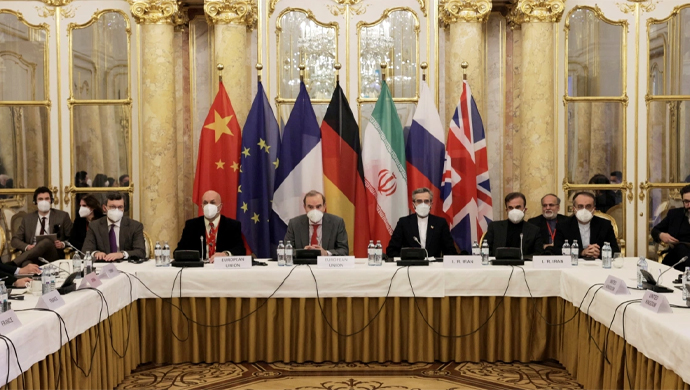Iran’s nuclear program is “galloping ahead” and the International Atomic Energy Agency has very limited visibility on what is happening, said IAEA chief Rafael Grossi in an interview with Spain’s El Pais newspaper on July 22. These remarks have been described by analysts as a serious warming about Tehran becoming a nuclear threshold state in the near future. The Wall Street Journal published a piece on July 25 titled “The Iran Nuclear Deal’s Convulsive Death.”
All the while the claims made by Tehran paint a completely different picture. “The path is paved for an agreement in the near future,” said Tehran’s Foreign Ministry spokesperson in press conference on July 20. “If the opposite party acts in logic and reason, the negotiations can lead to results,” said Iranian regime President Ebrahim Raisi on July 26.
The correct nature of these two different viewpoints can be concluded from the latest position of EU foreign policy chief Josep Borrell and his op-ed in the Financial Times on July 26. “I have concluded that the space for additional significant compromises has been exhausted,” he emphasized.
Newspapers in Iran, such as the state-run Hamdeli daily, are also publishing articles describing the “the light of the nuclear deal is dimmer than ever,” according to a piece published on July 22. “There is no motivation to revive the JCPOA,” reads a piece in the state-run Setareyeh-Sobh daily on July 25, referring to the 2015 nuclear deal by its official acronym, the Joint Comprehensive Plan of Action. Prior to this, newspapers affiliated to regime Supreme Leader Ali Khamenei, including Kayhan, Vatan-e Emruz, and… have long described the efforts to revive the JCPOA as useless and consider the deal as a rotten corpse.
The question is when relevant parties are talking of the “JCPOA’s demise” and opportunities coming to an end for a compromise, why are we witnessing positive signals from Raisi himself and the regime’s Foreign Ministry?
The answer can be found in the unappetizing consequences of acknowledging their failure, highlighted in a piece published in the state-run Resalat daily on July 25: “Iran is not in a position to accept the responsibility, weight, and price of the nuclear negotiations reaching an official failure and the JCPOA falling short of revival… Announcing the official end of the nuclear talks and the death of the JCPOA will result in an explosive status inside Iran. In addition to the direct and immediate impact on the country’s economic conditions, the people’s living conditions, and unbridled inflation, it will have a deep psychological impact on public opinion. And most important of all, there is no method to replace the JCPOA.”
This coming from the Resalat daily, considering its close affiliations to the Iranian regime’s ruling elite, is significant in and of itself.
This “explosive status inside Iran” has led to an escalating crisis inside the mullahs’ regime. What’s even more interesting is the fact that Khamenei had Raisi be appointed as the regime president to unify his ranks and file in preparation to resolve his regime’s crises. All the while, Khamenei’s domestic calamities have prevented him and his regime from taking advantage of the opportunities placed before them thanks to the West’s appeasement policy. This can result in more sanctions against the mullahs’ regime and further fuel domestic unrest.
As a result, despite the efforts of Khamenei and his inner circle to portray a confident of their regime regarding the nuclear dossier, the death of the JCPOA will actually render an avalanche of further domestic and international predicaments for the mullahs’ regime.
Even despite the warnings issued by various observers about the mullahs’ regime reaching a nuclear threshold state, and even if they eventually obtain nuclear weapons, this will not relieve the mullahs of their main concern: the Iranian people’s enmity and their will to overthrow the regime.
Iranian Resistance Leader Massoud Rajavi said in January 2022: “Now that Raisi is the regime’s president, regarding the nuclear dossier, the mullahs’ regime making advances or suffering setbacks in the cat-and-mouse game over the JCPOA in 2022 will render no meaningful results. The result will be seen in further protests and uprisings.”





